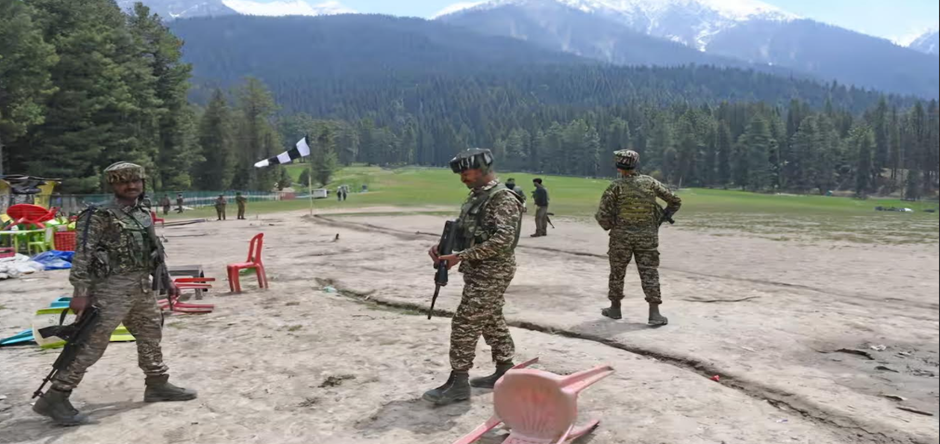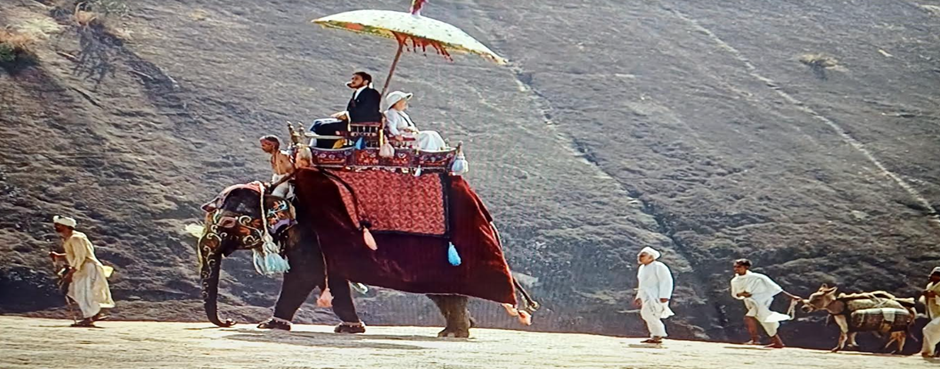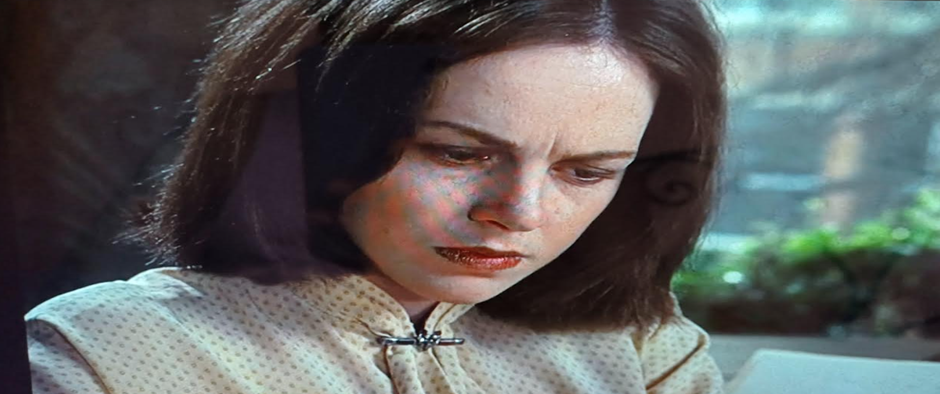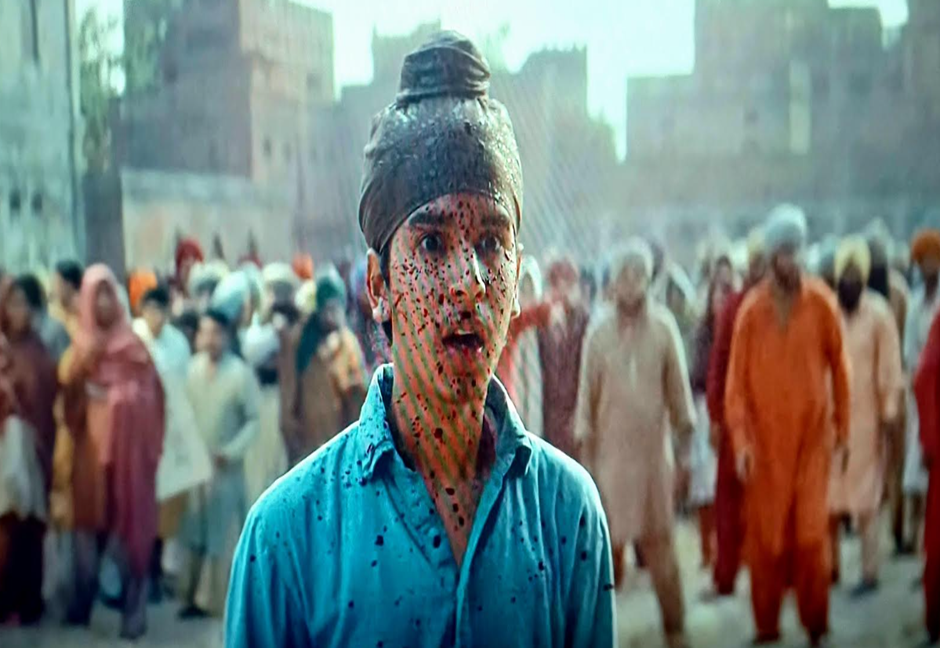PART-II. HOW LOVE TRANSCENDS ALL BARRIERS FOR LAZMI SHAHEEN AND MERYL REETHERSPOONE
- Jayant Banerjee

- May 10, 2025
- 13 min read

Calcutta, India 1944. It was time for Lazmi to quickly regroup her life. Jogi was indeed dear to her and the disbelief at the brutality her brother inflicted on Jogi completely shattered her. Her first reaction was to flee Majora and head for Calcutta, where she had a dear friend – she believed things would work out anyway. She took the first train to Calcutta to reach the humdrum of muzzled people running to somehow eke a living out of nothing !!
It took two years for Meryl Reetherspoone to visit India again, now as Meryl Reetherspoone Dexter, wife of Bill Dexter – Tutor of English at Queens College.
During regular visits to Queens College, Adela, Meryl’s mother, chanced upon different teachers at the school. Bill Dexter was a sweet personality, Adela believed, and would be the right guy for Meryl, she thought. A meeting was arranged and Meryl agreed to the marriage as she knew her mother had little time with her - the cancer was aggressive and the doctors found no hope.
Meryl was happy she was in India once again, the fiery roads and simple women folks – who endured many unhappy moments in their lives, as she came to acknowledge - and had in mind a profound desire to know this country many Englishmen spoke with a broad smile back home.

Couple of years back though, Meryl had come to India for a week’s visit along with her mother, hosted by local British officer Charles Hope. Meryl announced that she was desirous to see India in all its forms. Meandering through several discussions Meryl said she avoided speaking to Indians unless they were her own servants, but amused everyone saying "I want to know India and I want to see Indians!"
Mrs. Jennifer Morton, well known to Adela, had long been to India. A stupid British woman, Jennifer spoke without hindrance and more often than not left the audience mortified for her shameful utterances.
When Meryl stepped to visit the place and know Indians, Jennifer was left dumbfounded.
Enduring these two long years Mrs. Morton would still be in India and seeing her Meryl was disgusted and felt sorry shamefaced at the half-witted Shakespeare-an English she gulped out, more so now when Bill Dexter would look at her disparagingly, “… what kind of friends do you make Meryl? I didn’t know her, she bounced on my lap in my earlier visit, I had a long stint with her, do you mind helping me with a glass of wine, dear?” Meryl was irate, one with the hot sun and the other, with Bill’s pointedly disgusting remarks.
Bill strode to pour some wine for Meryl.
Next day Meryl went to the Ballard Pier. It is known that Bombay Port Trust reclaimed 22 acres of land at Ballard Estate between 1914 and 1918, Ballard Estate was named after Colonel J.A. Ballard, a founder of the Mumbai Port Trust, which constructed the Port and Ballard Pier. Meryl was fascinated with the efforts at the Pier and she would love to know the endeavour her fellow Englishmen would have put to increase business from this seemingly important Port.

But to her consternation, Meryl was greeted with contempt at the Port with a large, angry crowd uttering abuses for the English and demanded they leave India immediately.
It turned out that earlier in the day, one Indian worker at the port was manhandled and subsequently killed by an English police officer.

She shouted at Bill and told to return immediately as the crowd was increasingly becoming restive. All of a sudden, an Indian officer, with khakis on, strode quickly towards Meryl, “Mrs. Dexter – no need to worry, I’m in charge and the situation would be fully under control in no time. Please be my guest and I’ll be honoured if you have faith in me”.
Meryl was struck by the confidence and power of his personality. Standing at almost six feet with bright eyes Rahul Singh was easy with his English and had an assured gait, Meryl felt, which was quite often not found among these people !!
Meryl was almost sure, but could not believe, and after days of thought questioned herself - “Am I overly taken in by Rahul?”. She had no time to blush, all of a sudden Rahul had taken her senses completely and she was helpless as she could not overlook him. Bill had crossed her path with having very little or no impact on her life. She realised she did not love Bill.
She muttered to herself, her marriage was in ruins !!
It was raining heavily and Meryl was quickly escorted by Shane Gough, the entourage manager, to a waiting cart and to safety. Did Rahul arrange all this(?), Meryl was not sure!
Nehru dreamed of an India, freed alike of the shackles of poverty and of superstition, unburdened of capitalism, an India in which the smoke stacks of factories reached out from her cities, an India enjoying the plenitude of that Industrial Revolution which her colonizers had denied her access to.

Gandhi felt no one might have seemed a more likely candidate to lead India towards that vision than Jawaharlal Nehru. Under the cotton khadi he wore in deference to the dictates of Congress, though he remained the quintessential English gentleman. In a land of mystics, he was a cool rationalist.
Nehru despised India's priests, her sadhus, her chanting monks and pious sheikhs. They had only served, he felt, to impede India's progress, deepen divisions and ease the task of foreign rulers.

And yet, the India of those sadhus and superstition-haunted masses had accepted Nehru for thirty years as he had travelled across the country haranguing the multitudes. Clinging to the roofs and sides of tramways to escape the slums of India's cities, on foot and by bullock cart in the country sides, his countrymen had come by the hundreds of thousands to see and hear him. Many in those crowds could not hear his words nor understand them when they did. For them, it had been enough however just to see, over the ocean of heads around them, his frail and gesticulating silhouette. They had taken darshan, a kind of spiritual communion received from being in the presence of a great man, who despised Jinnah, and that had sufficed.
Abhimanyu Sen (Abhi) had come to the Calcutta railway station to receive Lazmi. Abhi was a nice boy of good parentage and had been working at Lahore Talkies as an assistant to camera operator. They had met earlier once when Lazmi was in Calcutta to see her aunt. Lazmi felt assured of herself finding a good foot at this crowded city, more so to get Abhi know her tragedy, he promising her to get a job – she had to feed two mouths. Her mother Mehroz Bano was still in shock what happened to Jogi back in Punjab. After all, Lazmi had Bano’s back when it came to Jogi.

Lazmi got a job at Lahore Talkies, helping technicians to fix the sets before a take. Abhi was happy for her as both grew affectionate towards each other, Lazmi often brought lunch for Abhi and he loitered with her in spare time.

But Lazmi never forgot her beloved Jogi, she was simmering inside to teach her brother Rehmat a lesson. Abhi by her side, she quietly took a night train to Majora when she got the news that Rehmat had again come to Majora to loot people.
In the dead of night that evening Lazmi and Abhi set the entire house on fire as Rehmat and his men were fast asleep – the dacoits had consumed large amounts of food and alcohol !!

Rehmat and his men were burnt to death.
Back in Calcutta, Lazmi got a chance in one of Saifuddin Khan’s film. Saifuddin or Saifu was a big producer of films and was head over heels in love with Lazmi - and she utilised that opportunity.
Over time she grew in her work and slowly started keeping Abhi aside as he was only an assistant to cameraman and Saifu had catapulted her to a rising star of Roy Talkies. Abhi had lost his job at Lahore Talkies, Saifu did not like Abhi and now he was back to being out of employment.
Abhi was pained at Lazmi's turn, in fact it still did not go down with him that she was in Saifu’s arms – how could she be so indecent and lewd hurling Abhi out of the window in a flash not knowing that corrupt Saifu would milk every inch of her skin and would throw her away !!
Shreshta was right about Lazmi, when she assessed her as an opportunist swimming with the tide to make money. That day Abhi realised the worth Shreshta had in his life, how so different she was from Lazmi !!

As soon as Abhi got a job at Roy Talkies as a waiter he married Shreshta Roy – it did not matter to him a bit that Lazmi was working at the same studio - she was an actress now!
Life had taken a brutal turn for Abhi and he would reminisce his early days, the long walks with Lazmi, the happy lunch time together at Lahore Talkies, the friendly staff there always pushing them as a lovely pair and above all, the togetherness Lazmi showed. Was it all unreal?
Will Lazmi eventually go back to Abhi? Only time will tell !!
Delhi,1943-46. Between Gandhi and Nehru, a fascinating father-son relation grew up, animated by all the tensions, affections and repressed guilt such a relationship implied. All his life, Nehru had an instinctive need for a dominant personality near him, some steadying influence to whom he could turn in the crises engendered by his volatile nature.

Time was ticking very fast! Jinnah could not wait for Pakistan to happen! With his usual candour, Admiral Mountbatten told Nehru that he had been given an appalling responsibility and he intended to approach the Indian problem in a mood of stark realism. As they talked, the two men agreed on two major points: one - a quick decision was essential to avoid a bloodbath and two - the division of India would be a tragedy. Could it have been avoided?
No. The division did happen. Only if Mountbatten had known the illness of Jinnah at the time of Partition we all would have been saved from this dreadful country called Pakistan – a country who never improved from the grotesque demeanour of rabidity, brutality and from foolishly claiming they knew Islam.
Pakistan never understood Islam !!
Jammu & Kashmir, 2025. Because Islam never tells to kill innocent people brutally just because they are not Muslims. What happened on 22nd of April 2025 at Pahalgam, Jammu & Kashmir – 77 years after Jinnah boastfully told his allies that in Pakistan the Hindus and the Muslims would live in peace – places Pakistan as a country of deceit.
And a country which fosters extremism and militancy.
Madiha Afzal writes in the book Pakistan Under Siege - Extremism, Society and the State : Quote. “ The Pakistani state has used its education system as a vital pawn in shaping its citizens' thinking. I identify the role that education - education in terms of years in school, of curricula in public and private schools, and of the much-maligned madrassa system, which is often blamed for fostering extremism in Pakistan - plays in defining attitudes on extremism. I do this through quantitative analysis of survey data, interviews with students in schools and colleges, and an in-depth study of
textbooks and teachings

Much of the current work on extremism in Pakistan tends to look at it from a detached position, from a top-down security perspective, limited to the actions of the state with little focus on how those actions affect the ordinary Pakistani.
The historical underpinnings of the state's actions are too often ignored. We are left with a one-dimensional picture of a complex, richly textured country of 200 million people. Using rigorous analysis, interviews, and a historical narrative, I fill out the picture of Pakistan's relationship with extremism. The methodological approach is honest. I hope to convince everyone that there is hope yet for this beleaguered nation.” Unquote.
The most noble of human emotions is to find hope in the midst of tragedy. One of the tourists killed by the terrorists in Pahalgam, Jammu & Kashmir on April 22, 2025 was N. Ramachandran from Kerala. On her return home, his daughter, Arathy Sarath, spoke movingly of the succour she found from two young men in the wake of her suffering. Ms Sarath said :
"Musafir and another local driver Sameer were with me all through, including when I stood outside the morgue till 3 am. They treated me like a younger sister. Kashmir has now given me two brothers.”

Musafir and Sameer were entirely representative of how Kashmir, as a whole, reacted to the barbarism that claimed so many innocent lives.
Several tourists who were at the scene of the attack were shepherded to safety by their Kashmiri guides. At least one of these guides, like others a Muslim by faith, was killed. As tourists sought to flee in panic, clerics opened mosques to provide beds for those who did not have hotel bookings. Taxi drivers refused to charge passengers seeking to get to Srinagar airport.

Madiha Afzal has used a line curve using Pew Research Centre’s Global Attitudes Survey Data for Pakistan for the years 2002-15.
Pakistani respondents were interviewed on the question :
“Some people think that suicide bombing and other forms of violence against civilian targets are justified in order to defend Islam from its enemies. What is your opinion?”
The below graph shows above 80% of Pakistani nationals said these kind of brutalities were never justified.

The year 2008 is very significant in the wake of 26 November terrorist attack in Mumbai !!
Then, where is the problem?
The average Pakistani knows that Jinnah made Pakistan in a hurry and from then on everything was lopsided. It is very unfortunate that the ruling authority of this nation has gone to the Military - the democratic gimmick is done to attract international funds – which, although, is drying out very fast. The appointed ministers and prime ministers are only sitting ducks waiting for instructions from Military. The country gets ruled by the so called “All the Generals Men.”

Lashkar-e-Taiba (LeT) is one of the main anti India militant groups based in Pakistan, fighting to free Kashmir from Indian control. Jaish-e-Mohammad (JeM) is the other. These groups do not attack the Pakistani state or Pakistani targets; they target Indian forces in Kashmir, and government and civilian targets in India. These groups, the Kashmiri jihadists, began functioning at a heightened capacity in the 1990s; they drew from the ranks of the mujahideen trained for the Soviet jihad once that war ended.
Scholars and analysts argue that Pakistan's spy agency, the Inter-Services Intelligence (ISI), harbours ties with and supports Lashkar-e-Taiba and Jaish-e-Mohammad and that it directed the mujahideen towards the Kashmir cause. Though the Pakistani army denies this, it is well known in Pakistan that despite these groups being proscribed, their leaders are largely allowed by the state to carry out covert operations.
We require a Vladimir Putin to tackle this imbroglio !! But Putin’s Ukraine is not as military savvy as Pakistan’s.
Gaya,1943. Meryl was immensely happy when Shane Gough arranged a tour to the Barabar caves. These caves are the oldest surviving rock cut case in India, situated on the eastern stretches of town of Gaya. The caves are placed in the twin hills of Barabar and Nagarjuni.
Shane had arranged for Rahul Singh as the safety and escorting officer for the tour, knowing Meryl was very fond of Rahul.
Except for the Barabar caves - and they were twenty miles off, the city of Gaya presented nothing extraordinary, edged rather than washed by the river Falgu, it trailed for a couple of miles along the bank scarcely distinguishable from the rubbish it deposited so freely. There were no bathing steps on the river front, as the river happened not to be holy here, indeed there were no river front, and the bazaars shut out the wide and shifting panorama of the stream.
Rahul had arranged for a makeshift wash room for the ladies, twenty-five of them laughing and giggling all the way to the banks, not a care in heaven for the extremely torrid sun on their heads.

Meryl would silently study the handsome Rahul and the expert way of him to arrange things. Shane was happy she enjoyed the company of Rahul – he often led her to different sites around the cave, sometimes holding her soft hands as she slipped through rough lanes muttered with stone and silt !!

The Gaya streets were mean, the temples ineffective and though a few fine houses existed they were hidden away in gardens and down alleys whose filth deterred all but the invited guests. Gaya was never large or beautiful, but two hundred years ago it lay on the road large and beautiful, then imperial, and the river, and the fine houses date from that period.
Shane had arranged an elephant ride for Meryl to the caves, she enjoyed thoroughly as Rahul was at the front taking care of the mahout and the roads that led to the mountains.

It was very dark inside, the local officer had allowed a large crowd into the cave, men and women who had braved the scorching heat quickly settled into the darkness, at least the heat had to be withered away. Rahul took Meryl’s hand and led her into the pathways to the cave. Soon, they were ahead of the crowd and though the darkness instilled fear Meryl would feel comfortable and assured in Rahul’s company. Slowly she came close to Rahul and in one swift move hugged him tightly. The cave had become lonely then and Bill was outside with Shane – both were busy arranging food and niceties.

Meryl would not let go of Rahul as he planted a passionate kiss on Meryl’s lips, so profound was the togetherness that time stopped there for a while as if enjoying the love both had for each other.

Back to the cottage, that evening was profound in the life of Meryl. She loved India and loved Rahul dearly but was very unsure how future would behold for them. Bill had to be told of the development immediately after reaching England, Adela would have reached by now, she left early as the cancer needed immediate medical attention.
The next morning Meryl found an express telegram on her table, her mother had passed away as she could not brave the dreaded disease. Meryl was required immediately in England, the travel plans would have to be done quickly – Meryl had to reach in time for the funeral.
She moved swiftly, summoned Shane Gough and told him to arrange tickets, seeing Meryl distraught with pain and grief, Shane assured he would inform Rahul about the plans and after sometime request Rahul if he was willing to pay a visit to Meryl in England !!
Meryl had to leave Rahul behind !
Maybe next time Meryl would come alone, Bill had to be on his own, almost surely, she felt, to tread a fresh path with Rahul, for a fresh journey into the soft lanes and muddy roads of her beloved India !!
Over time, can Rahul reach out to his dearest Meryl?
Who knows !!
Disclaimer: The names Jogi, Rehmat, Lazmi, Adela, Meryl Reetherspoone, Charles Hope, Bill Dexter, Rahul Singh, Shane Gough, Mehroz Bano, Shreshta Roy, Abhimanyu Sen and Jennifer Morton are imaginary and do not hold any resemblance to any person(s) dead or alive.




Dear Readers,
I thank you from the bottom of my heart for the attention, love and affection you have given to this article. It is truly amazing and I am humbled. Some comments were angry and distasteful in nature - I take it all in my stride !!
Comments, whether it is good, bad or ugly are most welcome. Please express yourself freely and honestly. I treat each comment as a motivator - it grounds me and propels me to work harder.
You all are amazing people and my deepest gratitude remains with you! Keep loving my articles and if possible please spread my blog platform - www.cheekychatur.com to all your friends, near and dear ones! I would mean a…
whispers from West ----- Look, it’s not India’s military hardware that’s raising eyebrows out here — we’ve seen big armies before. What really caught us off guard was the silence. No chatter, no leaks, total radio blackout. Not a blip on our radar until it was already done. That level of operational discipline? That’s what makes people sit up. When even our best ears to the ground miss it, you know you're dealing with a serious intelligence game. It’s not the noise that worries us — it’s the quiet
Internal Analysis Brief – Eyes OnlySubject: Recent Indian Covert Operations
Summary:Contrary to typical regional dynamics, India’s recent operation (ref: Operation Sindoor) has triggered more concern in Western intelligence circles than expected — not because of overt military strength, but due to the manner in which it was executed.
Key Observations:
Radio Silence: No detectable comms. No SIGINT pickup, no chatter. Complete blackout. That’s rare — and concerning.
Zero Leaks: No early warning. Our assets in the region reported nothing until the operation had concluded. That’s a significant blind spot.
Tactical Precision: The execution was clean, controlled, and deniable. Classic signature of a matured intelligence culture, not a one-off lucky hit.
Assessment:The concern isn’t rooted in India’s arsenal — it’s in their ability to operate in…
Mr Jayant - is this a recap of Meryl story ? i thought she dead
Testing - #6777qa@MK — bugtag #1229